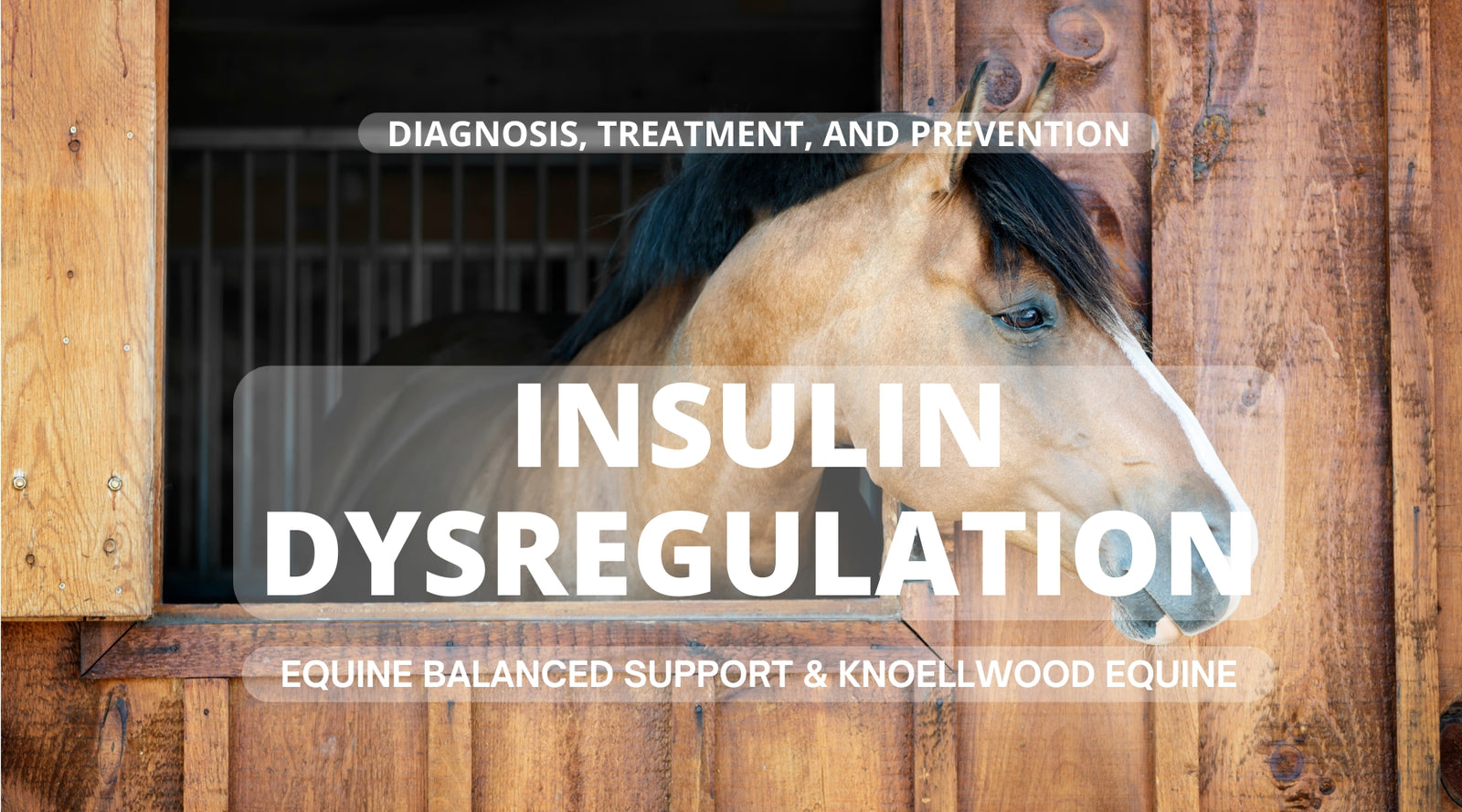Insulin Dysregulation in Horses: Diagnosis, Treatment, and Prevention

Understanding Insulin Dysregulation in Horses: The Gold Standard Terminology
In recent years, the term "Insulin Dysregulation" (ID) has emerged as the gold standard in describing insulin-related issues in horses, surpassing the previous terminology "insulin resistance." This shift reflects a more nuanced understanding of the condition and its implications for equine health. This term more accurately captures the complex interplay between insulin and glucose in equine metabolism and provides a more precise framework for diagnosis and management. Insulin dysregulation encompasses a broader spectrum of abnormalities, including:
- Insulin Resistance: This occurs when the body stops responding appropriately to insulin. As a result, the muscles, fat, and liver do not adequately absorb glucose from the bloodstream.
- Hyperinsulinemia: When insulin concentration in the blood or plasma is unusually high, sometimes this includes hyperglycemia. There are two types of Hyperinsulinemia:
- Basal or Resting: This is after a period of fasting.
- Postprandial: This is after eating or receiving an oral dose of sugar.
What Tests Diagnose Insulin Dysregulation?
Veterinarians use various blood tests to diagnose insulin dysregulation in horses, each with advantages and considerations:
- Fasting Insulin and Glucose Levels: A baseline assessment of fasting insulin and glucose concentrations in the blood provides a snapshot of the horse's metabolic status. Stress, diet, and other factors affect results; experience is necessary to interpret them correctly. "Fasting" insulin levels are taken after hay (no grain), not "no food." Horses should not have grain within 4 hours of having a test taken; first thing in the morning before grain or later in the afternoon before dinner are convenient options.
- Oral Sugar Test (OST): The OST involves administering a known quantity of glucose (often in the form of corn syrup) orally and measuring insulin response over time. This practical test can be performed on-farm but requires careful handling to ensure accuracy.
- Combined Glucose-Insulin Test (CGIT): The CGIT is a more controlled diagnostic tool that measures the horse's insulin sensitivity and glucose tolerance by administering glucose and insulin intravenously and monitoring the response. Rarely used in the field, this test is considered more accurate but requires specialized equipment and conditions.
What Health Problems Can Occur in Horses Due to Insulin Dysregulation?
- Laminitis is the most severe and well-known complication associated with insulin dysregulation. Laminitis is a painful condition affecting the laminae that bonds the hoof wall to the coffin bone in a horse's hoof. Horses with insulin dysregulation are at a higher risk of developing laminitis, which can lead to chronic lameness and, in severe cases, may necessitate euthanasia.
- Obesity: Insulin dysregulation can contribute to an increased risk of obesity in horses. Insulin is the hormone for regulating glucose metabolism, and when its function is impaired, it can lead to abnormal fat deposition and weight gain. Obesity, in turn, can exacerbate insulin dysregulation, creating a vicious cycle.
- Metabolic Syndrome: Horses with Equine Metabolic Syndrome (EMS) have insulin dysregulation, are obese, and are at extreme risk for having laminitis.
- Reduced Performance: Horses suffering from insulin dysregulation may also experience a decrease in performance. The disturbances in energy metabolism can lead to muscle fatigue, reduced stamina, and diminished athletic ability.
- Increased Risk of Infections: Some evidence suggests that chronic high insulin levels can impair the immune response, making horses more susceptible to infections.
What Medical Treatments Are Available for Insulin Dysregulation?
Treatment of insulin dysregulation focuses on managing symptoms and mitigating the risk of associated conditions, such as laminitis. Options include:
- Metformin: An oral medication that improves insulin sensitivity and glucose utilization in peripheral tissues. A vet commonly prescribes it for horses that are difficult to manage through diet and exercise alone—prescribed only when other management options have failed because there are many adverse side effects associated with this drug.
- Thyroid Hormone Supplements: Sometimes, a vet prescribes synthetic thyroid hormones to accelerate metabolism and aid in weight loss; careful ongoing monitoring is required.
- Sodium-glucose co-transporter 2 (SGLT2) inhibitors Are an option for horses affected by laminitis and severe ID who are not responding to other measures. As with all medications, this class of drugs is only for horses with a specific set of issues, and these are more expensive than other treatment options. A vet will run follow-up blood tests to monitor for potential adverse side effects.
What are the best Management strategies for Horses with Insulin Dysregulation?
Effective management of insulin dysregulation involves a holistic approach to diet, exercise, and environmental factors:
- Dietary Adjustments: Reducing non-structural carbohydrate (NSC) intake through a forage-based diet with limited access to grass, especially during peak growth times, is crucial. Soaking hay rations to reduce sugar levels may be required. Supplemental feeding should focus on high-fiber, low-sugar, and low-starch options.
- Exercise: Regular, moderate exercise helps improve insulin sensitivity and promote a healthy weight. Even light exercise can have significant benefits for insulin-dysregulated horses.
What Ingredients should I look for in a Supplement to Support Healthy Insulin Levels?
Certain supplements may help support healthy insulin levels and overall metabolic function. These are just a few ingredients to look for in a supplement:
- Magnesium and Chromium: These minerals enhance insulin sensitivity. Supplementation should be based on specific dietary deficiencies and under veterinary guidance.
- Omega-3 Fatty Acids: Flaxseed and chia seeds contain omega-3s, which can have anti-inflammatory effects and may help improve metabolic health.
- Antioxidants: Supplements like vitamin E and selenium can support overall health and may assist in managing oxidative stress associated with insulin dysregulation. Supplementing with vitamin E and selenium is particularly important for horses on limited pasture and eating soaked hay.
"Insulin Dysregulation" offers a comprehensive and precise framework for understanding and addressing insulin-related issues in horses. Horses suffering from this condition can be cared for through diagnostic testing, medical treatment, careful management, and targeted supplementation. With collaboration between horse owners and veterinary professionals, a tailored approach for each horse will reduce the risk of further complications from this intricate disorder.
Need a safe treat for your horse suffering from ID? Grazers Nutri-Bites were designed specifically for horses with metabolic issues. Shop here:
https://equinebalancedsupport.com/products/performance-horse-treats
Written in collaboration with Dr. Megan Knoell of Knoellwood Equine https://knoellwoodequine.com/
Resources for further reading:
https://ker.com/equinews/insulin-dysregulation-insulin-resistance-horses/







Leave a comment